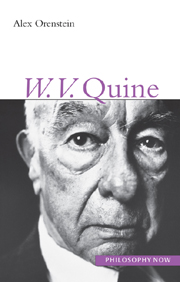
-
The digital format of this book is no longer available to purchase from Cambridge Core. Other formats may be available.
-
Select format
-
- Publisher:
- Acumen Publishing
- Publication date:
- 05 February 2013
- 30 June 2002
- ISBN:
- 9781844653126
- 9781902683300
- 9781902683317
- Dimensions:
- Weight & Pages:
- 00kg,
- Dimensions:
- Weight & Pages:
- 00kg,
- Series:
- Philosophy Now
- Subjects:
- Philosophy of Mind and Language, Philosophy
You may already have access via personal or institutional login- Series:
- Philosophy Now
- Subjects:
- Philosophy of Mind and Language, Philosophy
Book description
The most influential philosopher in the analytic tradition of his time, Willard Van Orman Quine (19082000) changed the way we think about language and its relation to the world. His rejection of the analytic/synthetic distinction, his scepticism about modal logic and essentialism, his celebrated theme of the indeterminacy of translation, and his advocacy of naturalism have challenged key assumptions of the prevailing orthodoxy and helped shape the development of much of recent philosophy. This introduction to Quine's philosophical ideas provides philosophers, students and generalists with an authoritative analysis of his lasting contributions to philosophy. Quine's ideas throughout are contrasted with more traditional views, as well as with contemporaries such as Frege, Russell, Carnap, Davidson, Field, Kripke and Chomsky, enabling the reader to grasp a clear sense of the place of Quine's views in twentieth-century philosophy and the important criticisms of them.
Reviews
"A valuable contribution to the literature, a book that will be useful to students, and helpful to their teachers too in providing a clear exposition of how the different themes in Quine's writings hang together, and in taking account of the development of his views, including the twists that emerged only in his last decade."
Source: Philosophical Quarterly
Contents
Metrics
Full text views
Full text views help Loading metrics...
Loading metrics...
* Views captured on Cambridge Core between #date#. This data will be updated every 24 hours.
Usage data cannot currently be displayed.
Accessibility standard: Unknown
Why this information is here
This section outlines the accessibility features of this content - including support for screen readers, full keyboard navigation and high-contrast display options. This may not be relevant for you.
Accessibility Information
Accessibility compliance for the PDF of this book is currently unknown and may be updated in the future.


